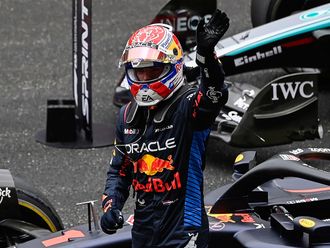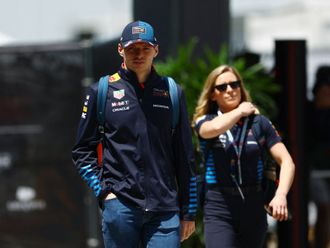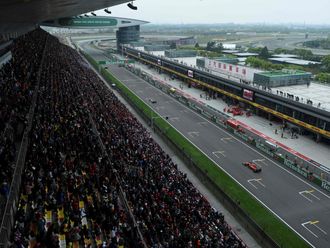Abu Dhabi: This weekend’s 2016 Formula One Etihad Airways Abu Dhabi Grand Prix will be the 29th time in Formula 1’s 65-year history that the tussle for the drivers’ championship has gone down to the final race of the season.
It will be also be the third time in the Abu Dhabi GP’s eight-year history that the title will be decided here following Lewis Hamilton’s success in 2014 and Sebastian Vettel’s 2010 triumph.
Here, in reverse chronological order, we recall five of the best final-race showdowns:
2012: Vettel vs Alonso, Brazil GP
Sebastian Vettel entered the final race having won four of the previous six. This put him 13 points ahead of his nearest rival Fernando Alonso. But the reigning double world champion made a terrible start and was behind Alonso for much of the race after a serious collision with Bruno Senna’s Williams. But he eventually finished sixth, three points ahead of second-place Alonso overall, securing a third consecutive crown.
Pre-race standings: 1. Vettel - 273 points, 2, Alonso - 260 points.
Post-race standings: 1. Vettel - 281 points, 2. Alonso - 278 points.
2010: Vettel vs Alonso vs Webber vs Hamilton, Abu Dhabi GP
The was the first four-way battle in history, contested by Vettel, Alonso, Mark Webber and Lewis Hamilton in Abu Dhabi. This would be the first of three finales here, the last of which was won by Hamilton in 2014. With Webber stuck in traffic, Alonso struggled to get past Vitaly Petrov’s Renault, while Hamilton claimed second place behind Vettel, who won the title by four points, ahead of Alonso. This was the star of Red Bull’s four-year era of domination.
Pre-race standings: 1. Alonso - 246 points, 2. Webber - 238 points, 3. Vettel - 231 points, 4. Hamilton - 222 points.
Post-race standings: 1. Vettel - 256 points, 2. Alonso - 252 points, 3. Webber - 242 points, 4. Hamilton - 240 points.
1994: Schumacher vs Hill, Australian GP
Many fans still insist that Michael Schumacher, who went into the race with a single-point lead, deliberately collided with Damon Hill’s Williams. Schumacher hit a barrier in his Benetton at 155mph to force him out of the race, but collided with Hill who attempted to continue but was forced to retire with a broken front-left suspension. As such, Schumacher claimed the first of his seven world crowns.
Pre-race standings: 1. Schumacher – 92 points, 2. Hill – 91 points.
Post-race standings: 1. Schumacher – 92 points, 2. Hill – 91 points.
1986: Mansell vs Prost vs Piquet, Australian GP
Heading into the final race in Australia, Williams driver Mansell led McLaren’s Prost by six points, with the second Williams of Piquet a further point back. Mansell started on pole but dropped down the order. However, with less than 20 laps to go he had worked his way back up to third - which would have been enough to claim him the title. Then, in one of the most famous moments in F1 history, his right-rear tyre exploded, eliminating him immediately. Piquet had to pit to avoid a repeat on his car, allowing Prost to snatch the lead. The Frenchman just clung on to win, despite a late charge from Piquet. Prost thus won an unlikely second world title by two points from Mansell, with Piquet one further back in third.
Pre-race standings: 1. Mansell – 70 points, 2. Prost – 64 points, 3. Piquet – 63 points.
Post-race standings: 1. Prost – 72 points, 2. Mansell – 70 points, 3. Piquet – 69 points.
1976: Hunt v Lauda, Japanese GP
Immortalised in the 2013 film Rush, a pulsating title race between Niki Lauda and James Hunt was memorable for the horrific crash suffered by Lauda at the Nurburgring, which almost killed him. The fearless Ferrari man recovered to take part in a tense title decider at a rain-lashed Fuji, however. But he pulled into the pits after one lap because it was too wet and Hunt continued in the lead. Tyre troubles dropped him to fifth, but with two laps left he made it up to a vital third place to clinch the title by a solitary point.
Pre-race standings: 1. Lauda – 68 points, 2. Hunt – 65 points.
Post-race standings: 1. Hunt – 69 points, 2. Lauda – 68 points.












